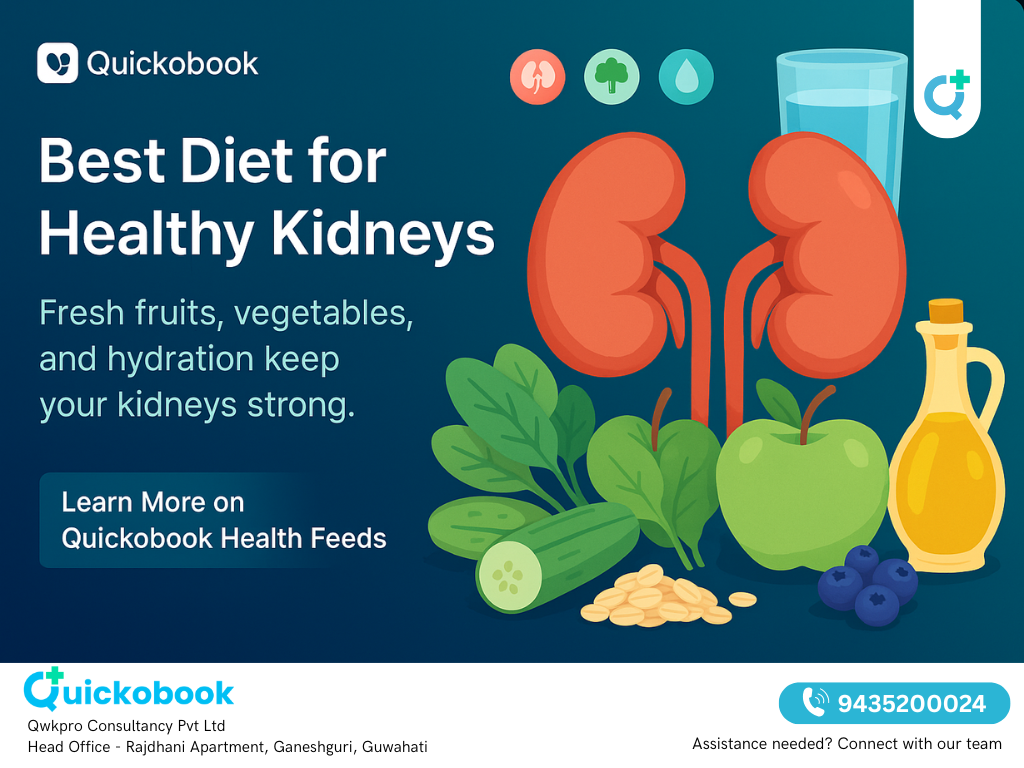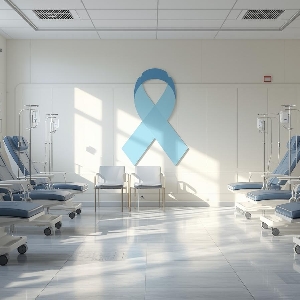Introduction
Your kidneys are among the most vital organs in your body. They purify blood, maintain blood pressure, balance minerals, and remove toxins. Unfortunately, unhealthy eating habits, lack of hydration, and excess salt can weaken them over time.
A well-balanced, kidney-friendly diet is the best natural way to protect your kidneys, prevent chronic kidney disease (CKD), and keep your overall health in check. In this blog, we’ll explore the best foods, meal patterns, and lifestyle habits to maintain healthy kidneys — based on simple Indian dietary practices.
Why Diet Matters for Kidney Health
Everything you eat affects your kidneys. These two bean-shaped organs work tirelessly to filter waste from your blood. When your diet is overloaded with salt, sugar, or protein, the kidneys are forced to work harder, which may lead to long-term damage.
A healthy diet helps in:
- Controlling blood pressure and sugar levels
- Reducing waste and toxins
- Preventing fluid buildup
- Supporting overall kidney function
Good nutrition is a key step in preventing or managing kidney-related issues.
Essential Nutrients for Kidney Health
1. Low Sodium Foods
Salt is one of the kidneys’ biggest enemies. Too much sodium increases water retention and raises blood pressure, which can damage kidney tissues. Avoid packed snacks, chips, pickles, papad, and restaurant foods. Instead, season your food with herbs like coriander, mint, cumin, or lemon juice for natural flavor.
2. Controlled Protein Intake
Protein is essential but needs moderation. Too much protein creates extra waste for the kidneys to filter. Include moderate portions of dals, lentils, paneer, or fish, but limit red meat and processed meats. Plant-based proteins such as tofu and moong dal are great for kidney health.
3. Potassium Balance
Potassium helps the heart and muscles function properly, but high levels can be harmful if kidneys aren’t working well. Limit bananas, oranges, potatoes, and tomatoes if you have CKD. Instead, enjoy fruits like apples, papaya, and guava, which are safer options.
4. Phosphorus Management
Excess phosphorus can weaken bones and harm kidneys. Avoid cola drinks, processed cheese, and bakery products. Choose fresh fruits, rice, and vegetables for daily meals.
5. Hydration — The Right Way
Water is crucial for flushing out toxins, but balance is key. Healthy adults should drink about 2–3 litres a day, depending on activity level and weather. If you have kidney disease or swelling, follow your doctor’s advice before increasing or reducing fluid intake.
Sample Indian Kidney-Friendly Meal Plan (No Table)
Start your day with lauki juice or a glass of lukewarm water with lemon to support digestion and hydration. For breakfast, go for oats with milk, poha, or upma loaded with vegetables.
At lunch, choose brown rice or chapati with bottle gourd, ridge gourd, or spinach curry, along with a light dal and cucumber salad. For snacks, pick roasted makhana, fruit slices, or a handful of unsalted nuts.
Dinner should be light — a bowl of vegetable soup, one chapati, and a simple sabzi. Avoid heavy meals and eat at least two hours before sleeping. Stay hydrated throughout the day with water, jeera water, or herbal tea.
Foods to Avoid for Healthy Kidneys
- Salty and fried snacks (chips, papads, pickles)
- Red meat and processed meats (sausages, bacon)
- Sugary drinks and colas
- Too much dairy like cheese or paneer
- Alcohol and smoking
- Packaged and instant foods
Managing Blood Pressure for Kidney Protection
High blood pressure is one of the biggest causes of kidney failure. You can protect your kidneys by keeping your BP under control:
- Limit salt to less than one teaspoon per day
- Eat fresh vegetables and fruits
- Exercise for at least 30 minutes daily
- Practice yoga or meditation to reduce stress
- Get regular BP and urine checkups
Lifestyle Tips for Kidney Health
- Maintain a healthy weight
- Exercise regularly
- Avoid overuse of painkillers
- Quit smoking and reduce alcohol
- Control blood pressure and blood sugar
- Sleep 7–8 hours daily
- Eat home-cooked, low-salt meals
When to See a Doctor
Consult a nephrologist or general physician if you notice:
- Swelling in your feet, face, or hands
- Foamy or dark urine
- Persistent fatigue or nausea
- Uncontrolled blood pressure
- Family history of kidney disease
Book top kidney specialists and dietitians instantly on Quickobook — India’s trusted healthcare platform.
Early Diagnosis and Treatment
Kidney problems can often be detected early with simple tests like:
- Blood urea and creatinine
- Urine protein and microalbumin
- Blood pressure monitoring
- Ultrasound if swelling or pain persists
Depending on the severity, treatment may include diet modification, medicines for blood pressure or diabetes, or dialysis in advanced cases. Always follow your doctor’s recommendations — never self-medicate.
FAQs on Kidney Health and Diet
Q1. What are the best foods for kidney health?
A1. Fresh fruits, vegetables, whole grains, and low-salt foods are best.
Q2. How much water should I drink daily?
A2. Usually 2–3 litres, unless your doctor limits it.
Q3. Can high blood pressure damage kidneys?
A3. Yes, hypertension is a major cause of kidney failure.
Q4. Is curd safe for kidney patients?
A4. Yes, but only in small amounts.
Q5. Which fruits support kidney health?
A5. Apples, papaya, and guava are great for daily intake.
Q6. Can dehydration cause kidney damage?
A6. Yes, it can lead to stones and reduced filtration.
Q7. Are bananas safe for kidney patients?
A7. Only if potassium levels are normal.
Q8. Can coffee affect kidneys?
A8. One or two cups a day are fine, but excess raises BP.
Q9. Is lemon water good for kidneys?
A9. Yes, it prevents stone formation and helps detoxify.
Q10. Can yoga improve kidney health?
A10. Yes, yoga lowers stress and blood pressure.
Q11. What foods should kidney patients avoid?
A11. High-salt snacks, red meat, processed foods, and cola drinks.
Q12. Does alcohol harm kidneys?
A12. Yes, it dehydrates and strains the kidneys.
Q13. Can kidney disease be reversed?
A13. Early stages can be controlled; advanced stages need medical care.
Q14. Is milk safe for kidney patients?
A14. In moderation, preferably low-fat.
Q15. Can high protein harm kidneys?
A15. Yes, it increases the kidneys’ workload.
Q16. Is rice good for kidney health?
A16. Yes, especially white or brown rice in small portions.
Q17. Can kidney problems cause swelling?
A17. Yes, because of fluid retention.
Q18. Is coconut water good for kidneys?
A18. Yes, in moderation, unless potassium is high.
Q19. Can sugar harm kidneys?
A19. High sugar causes diabetes, which affects kidneys.
Q20. Are kidney diseases common in India?
A20. Yes, due to poor diet, salt intake, and diabetes.
Conclusion
A kidney-friendly diet is your best defense against long-term health issues. By reducing salt, staying hydrated, and choosing natural, unprocessed foods, you can protect your kidneys and regulate blood pressure effectively.
For personalized advice or medical consultation,
Book expert kidney doctors today on Quickobook.com — your trusted health partner in India.
Disclaimer
This content is for educational purposes only. It does not replace medical advice. Please consult a registered doctor or dietitian before making dietary or medication changes.










Comments (0)
No comments yet. Be the first to share your thoughts!
Leave a Comment